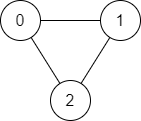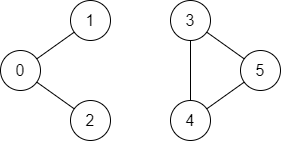Welcome to Subscribe On Youtube
1971. Find if Path Exists in Graph
Description
There is a bi-directional graph with n vertices, where each vertex is labeled from 0 to n - 1 (inclusive). The edges in the graph are represented as a 2D integer array edges, where each edges[i] = [ui, vi] denotes a bi-directional edge between vertex ui and vertex vi. Every vertex pair is connected by at most one edge, and no vertex has an edge to itself.
You want to determine if there is a valid path that exists from vertex source to vertex destination.
Given edges and the integers n, source, and destination, return true if there is a valid path from source to destination, or false otherwise.
Example 1:

Input: n = 3, edges = [[0,1],[1,2],[2,0]], source = 0, destination = 2 Output: true Explanation: There are two paths from vertex 0 to vertex 2: - 0 → 1 → 2 - 0 → 2
Example 2:

Input: n = 6, edges = [[0,1],[0,2],[3,5],[5,4],[4,3]], source = 0, destination = 5 Output: false Explanation: There is no path from vertex 0 to vertex 5.
Constraints:
1 <= n <= 2 * 1050 <= edges.length <= 2 * 105edges[i].length == 20 <= ui, vi <= n - 1ui != vi0 <= source, destination <= n - 1- There are no duplicate edges.
- There are no self edges.
Solutions
-
class Solution { private boolean[] vis; private List<Integer>[] g; public boolean validPath(int n, int[][] edges, int source, int destination) { vis = new boolean[n]; g = new List[n]; Arrays.setAll(g, k -> new ArrayList<>()); for (var e : edges) { int a = e[0], b = e[1]; g[a].add(b); g[b].add(a); } return dfs(source, destination); } private boolean dfs(int source, int destination) { if (source == destination) { return true; } vis[source] = true; for (int nxt : g[source]) { if (!vis[nxt] && dfs(nxt, destination)) { return true; } } return false; } } -
class Solution { public: bool validPath(int n, vector<vector<int>>& edges, int source, int destination) { vector<bool> vis(n); vector<vector<int>> g(n); for (auto& e : edges) { int a = e[0], b = e[1]; g[a].emplace_back(b); g[b].emplace_back(a); } function<bool(int)> dfs = [&](int i) -> bool { if (i == destination) return true; vis[i] = true; for (int& j : g[i]) { if (!vis[j] && dfs(j)) { return true; } } return false; }; return dfs(source); } }; -
class Solution: def validPath( self, n: int, edges: List[List[int]], source: int, destination: int ) -> bool: def dfs(i): if i == destination: return True vis.add(i) for j in g[i]: if j not in vis and dfs(j): return True return False g = defaultdict(list) for a, b in edges: g[a].append(b) g[b].append(a) vis = set() return dfs(source) -
func validPath(n int, edges [][]int, source int, destination int) bool { vis := make([]bool, n) g := make([][]int, n) for _, e := range edges { a, b := e[0], e[1] g[a] = append(g[a], b) g[b] = append(g[b], a) } var dfs func(int) bool dfs = func(i int) bool { if i == destination { return true } vis[i] = true for _, j := range g[i] { if !vis[j] && dfs(j) { return true } } return false } return dfs(source) } -
impl Solution { pub fn valid_path(n: i32, edges: Vec<Vec<i32>>, source: i32, destination: i32) -> bool { let mut disjoint_set: Vec<i32> = vec![0; n as usize]; // Initialize the set for i in 0..n { disjoint_set[i as usize] = i; } // Traverse the edges for p_vec in &edges { let parent_one = Solution::find(p_vec[0], &mut disjoint_set); let parent_two = Solution::find(p_vec[1], &mut disjoint_set); disjoint_set[parent_one as usize] = parent_two; } let p_s = Solution::find(source, &mut disjoint_set); let p_d = Solution::find(destination, &mut disjoint_set); p_s == p_d } pub fn find(x: i32, d_set: &mut Vec<i32>) -> i32 { if d_set[x as usize] != x { d_set[x as usize] = Solution::find(d_set[x as usize], d_set); } d_set[x as usize] } } -
function validPath(n: number, edges: number[][], source: number, destination: number): boolean { const g: number[][] = Array.from({ length: n }, () => []); for (const [a, b] of edges) { g[a].push(b); g[b].push(a); } const vis = new Set<number>(); const dfs = (i: number) => { if (i === destination) { return true; } if (vis.has(i)) { return false; } vis.add(i); return g[i].some(dfs); }; return dfs(source); }